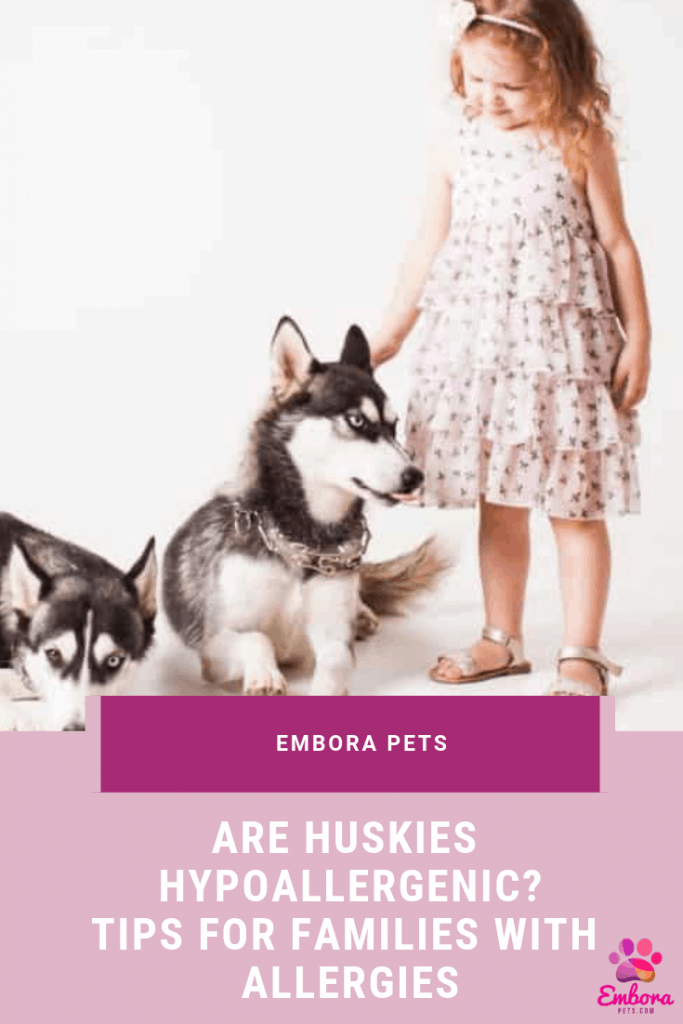Are Huskies Hypoallergenic? Tips for Families with Allergies
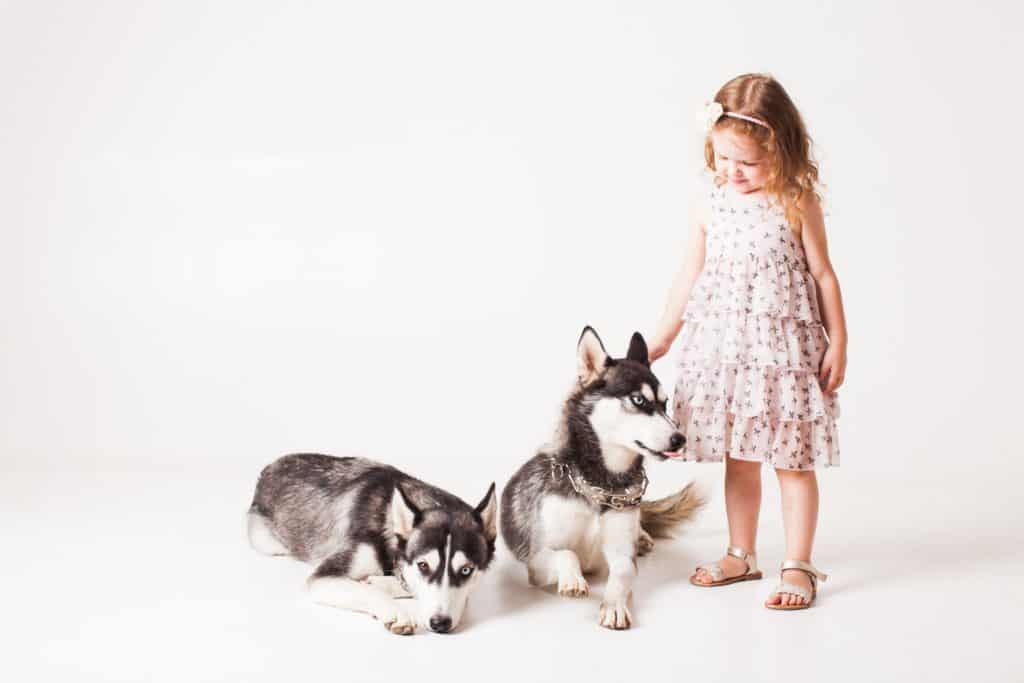
The Siberian Husky. Infamous for their strong bodies and thick coats specifically made for pulling sleds in colder climates. Due to their appearance, this breed is not only popular with the Mushers in North America who want to win a dog sled race, but H
Are Huskies hypoallergenic?
Huskies are not a hypoallergenic dog breed. Due to its history and breeding, this dog has a thick double coat that sheds twice a year. This double coat requires frequent brushing and maintenance. In addition to their semiannual heavy shedding, Huskies will also shed regularly throughout the year.
If you’re a person who suffers from allergies (or are living with someone who does) there are a few steps you’ll want to take before you decide to adopt a Husky. Below are some tips that I have prepared to help prevent any serious issues from arising in the home.
What about Huskies Causes Allergic Reactions?
Before we can understand what to do about your allergic reaction or the reaction in a family member, we must first understand what is causing this problem.
The answer is actually pretty simple. Some of us are just more prone to experiencing allergies than other people. It’s in our genetic code just as much as our inheritance of our mother’s eye color, or our father’s hair color.
So, really, you can thank your parents for what you or a loved one may be currently experiencing.
Honestly, pet allergies are caused by a simple thing.
Just as in any other animal, your Husky is producing what is called an Allergen – also called a Histamine.
Basically, Allergens are an allergy-producing protein that is present in your Husky’s dander, saliva, and even their urine.
“But it’s not a pet’s hair, or even the flaky, dandruff-like dander itself, that causes allergies. Instead “it’s a specific protein in the dander that people are allergic to,” says Chiu, associate professor of pediatrics and medicine (allergy/immunology) at the Medical College of Wisconsin. “With any allergy, from hay fever to peanut allergies, it’s always a protein in the substance that you’re reacting to.””
Webmd – Pet Allergies
Histamines have a way of attaching to your body that
The moment these allergens are released into the air, your genetic code may make you easily susceptible to developing the classic symptoms of an allergic reaction.
Unless you are severely allergic to the allergens being produced by your Husky, this may just be a minor annoyance for you and yours.
However, even mild annoyances can get in the way of accomplishing basic tasks throughout the day. So take the correct precautions when conditions arise. Do not be afraid to take the proper medications needed to get through the day,
How Can I Tell if I am Allergic to My Husky? (Common Symptoms)
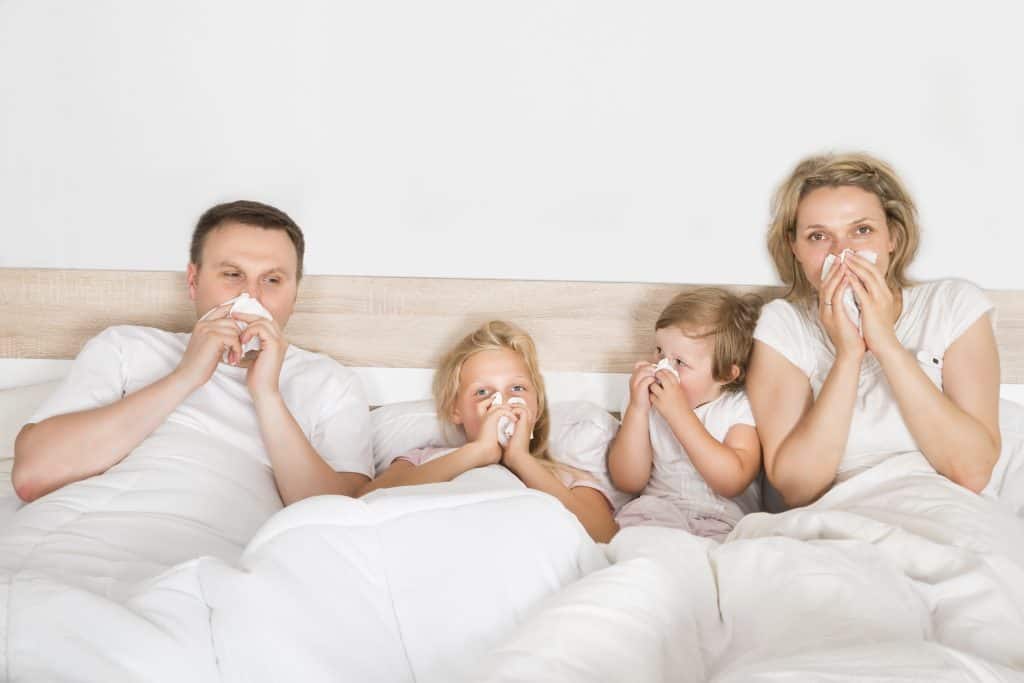
Pet allergies are similar to most other allergic reactions that you may have experienced in the past.
One of the first symptoms you might notice is an increasing difficulty with breathing. If this happens frequently around your Husky, you might begin to notice a pattern.
But beyond this, there are a few other symptoms you can experience when you are having an allergic reaction to your Husky.
Common Symptoms of Pet Allergies May Include:
- Stuffy Nose
- Swelling/Itchy Throat
- Itchy and Watery Eyes
- Raised or Bumpy Skin (Hives)
- Frequent Sneezing
If you or anyone you love are experiencing any of these symptoms – or experiencing them to the extreme – it would be best for you to make an appointment to speak with your doctor.
Especially in severe cases that cause external issues like Asthma, you should immediately arrange a meeting with your doctor to understand why such a thing is occurring in your family.
Your doctor will help you understand the next steps to take before you even have to think about giving away your precious Husky and family pet.
How Can I Prevent Allergic Reactions Caused by My Husky?
The best thing you can do to prevent an allergic reaction caused by your Husky is to take any medicine that your doctor may have prescribed to you.
Doctors may prescribe a simple over the counter Antihistamine, or an allergy shot in more severe cases.
Whatever he or she prescribes, make sure you are listening carefully to how you should be using the medication!
What Precautions Can You Take?
Besides taking the personal medication that the doctor has prescribed for you or your loved one, there are a number of things that you can do in your own home to prevent your allergies from proceeding to occur.
Keep Your Husky Out of Your Bedroom
This may seem like a simple solution, but there’s a reason it’s so easy.
By no longer allowing your Husky to sleep next to you or in your bed, you are preventing the allergens that were mentioned earlier
Chances are if you are experiencing allergies first thing in the morning, it is because you have pet dander in your bed or in other nearby spots inside of your bedroom.
Not only are the allergens sticking to you, but they are also sticking to your sheets and blankets in bed. So, at night when you are curled up asleep, the allergens are getting that much closer to you and your face.
Not only will it benefit you to close your bedroom door to the Husky, but you’ll also have to wash your sheets less often.
It will amaze you to see what a difference it will make in your day to day routine when you no longer have to worry about dealing with allergies when you wake up in the morning.
Keep Your Husky Outside
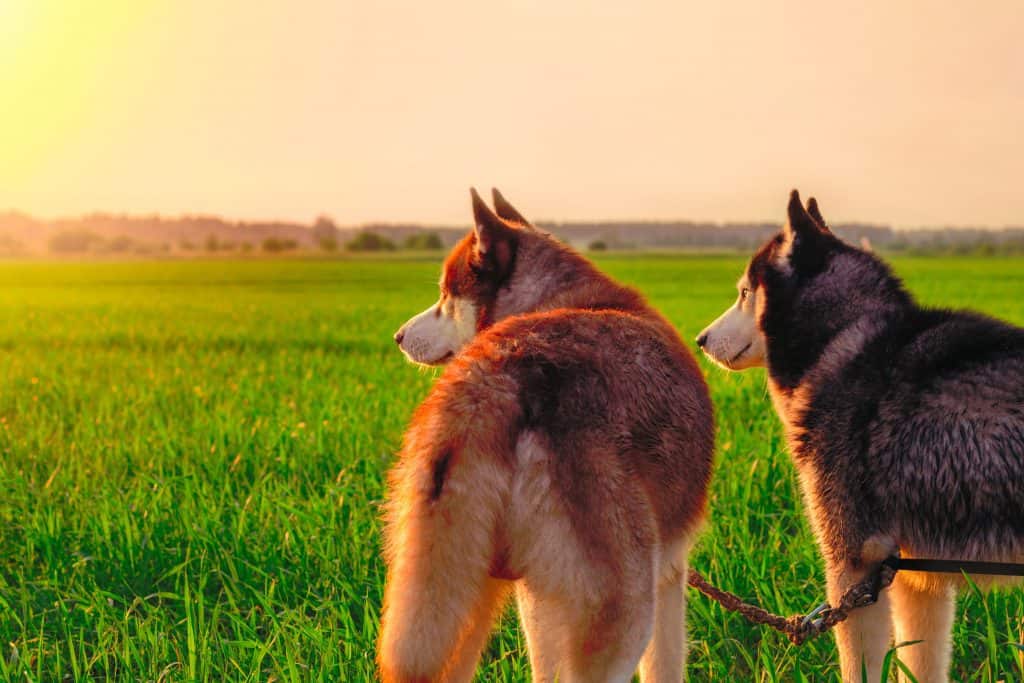
If limiting your Husky to all other parts of your home except for the bedroom isn’t working, then it might be time for you to take more drastic measures.
That’s right. As sad as it might be, it might be time for you to let your Husky stay outside during the day.
Of course, this only works if you have the proper outside space for your dog to spend a lot of time outdoors.
If you have a backyard with a fence, this actually isn’t a bad idea. Letting your Husky run around outdoors will also help your Husky in meeting their daily dose of exercise as well.
Just remember to keep them in good care if you are planning to make them an outdoor pet. Keep your Husky provided with proper food, water, shelter, and stimulation. Due to their thick fur, they can get overheated easily if you live in a warm area.
Also, remember to bring the Husky inside in case of severe weather forecasts. Do not just leave them stranded outside.
Keeping a dog outdoors because of a family member’s allergies is not a proper excuse to neglect or abuse them!
Keep Your Home Clean
If you aren’t crazy about the idea of having an outdoor dog all the time, then maybe it’s time for you to
Dusting, vacuuming, sweeping, wiping down counter – the whole shabang.
By carefully cleaning your home, and keeping it clean through regular maintenance, you should be able to keep a
Keeping these surfaces clean can also allow you to avoid touching the a
To help, try to get the family in on it. Just get used to the housework! It will be extremely helpful to everyone in the long run.
Keep Yourself Clean
Along with avoiding any dusty surfaces or touching your carpet where allergens may have attached themselves to the fibers – you should be regularly maintaining your own hygiene.
Washing your hands regularly can certainly keep you from spreading any allergy-causing proteins to your face.
Along with regularly washing your hands, you should be making sure that you are washing your face as well.
As I mentioned earlier, Allergens are not only found in pet dander, but in saliva as well.
If you or your children have been allowing your Husky – or any pet for that matter – to kiss your face during play, you should immediately be washing your face after the interaction.
In severe cases, you may even notice your eyes beginning to swell shut as well as your throat. If you have symptoms like this, you’ll want to avoid having allergens reach these areas of your body as much as possible.
Keep Your Dog Clean
The last, but most important thing on this list is keeping your Husky clean.
This means that you should be going through your Husky’s grooming requirements and meeting their other basic hygienic needs on a regular basis.
According to the American Kennel Club, Huskies tend to be a regularly self-cleaning breed. This means that they naturally groom themselves when they see fit and stay relatively clean longer than the typical dog breed.
However, this does create a problem for you since a
Since your Husky has a remarkably thick, double-coat that sheds entirely twice a year, you should be brushing your Husky about once every week. This regular brushing is just to keep any shedding to a minimum.
However, on average, you should be bathing your Husky just a few times a year.
Make sure to take some allergy medication before brushing out a Husky or giving them a bath to avoid any potential health problems.
Always be prepared for hair to go flying when grooming a Husky.
What Should I do to Treat an Allergic Reaction Caused by My Husky?
If you or a loved one have not been able to prevent an allergic reaction from occurring, here are some simple things that you should do.
With a severe allergic reaction, you should try, if possible, to use any prescribed inhaler to help with your breathing. Or, if you’re able, use a prescribed EpiPen. Try these options before you go to the hospital. You should still consider going to the hospital to get checked out though.
If you or a loved one is only experiencing a small allergic reaction, try taking a small dose of an over the counter Antihistamine such as Benadryl or Claritin.
Applying a topical ointment in case of a rash or the presence of hives is a good idea for any skin reactions. Go to your local drug store and see if they offer some topical versions of over-the-counter medications such as Benadryl.
Any, if not all of these medications should help in clearing up the effects of your allergic reaction.
In the worst case scenario, you should go to the hospital if your allergic reaction is severe enough.
Dealing With Allergies and Huskies
To recap, Huskies are not a hypoallergenic dog breed. Due to their long double-coats and frequent shedding of said coat, they are not the most ideal dog for a family that is prone to allergies.
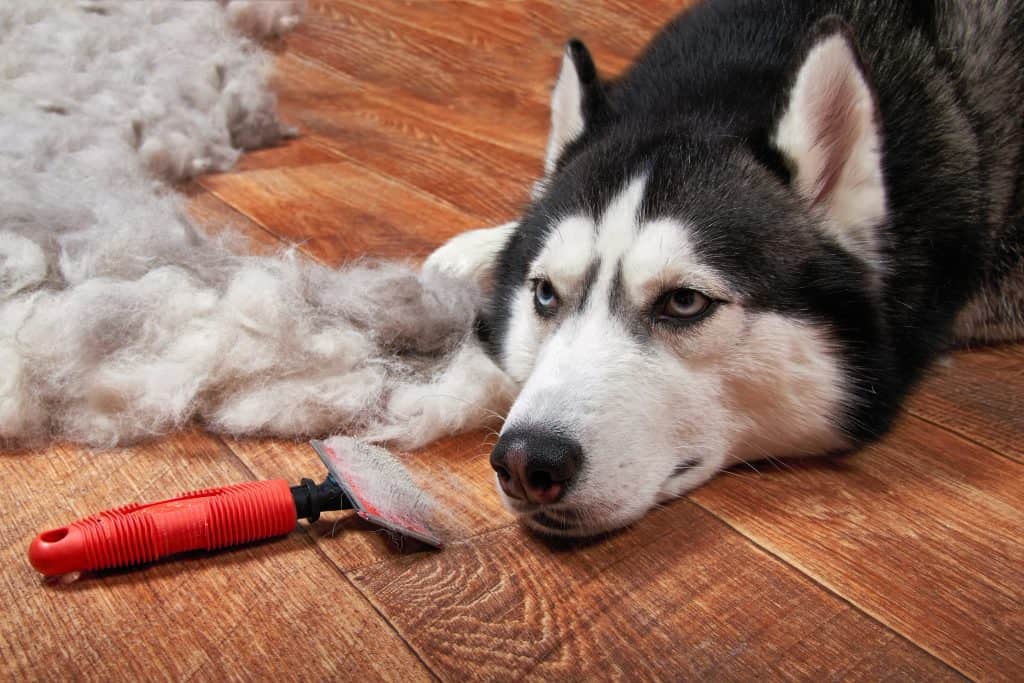
If you or a loved one are experiencing allergies due to a pet Husky, try to do one or more of the following:
- Take Prescribed Medication and Antihistamines
- Keep Your Husky Out of Your Room or Outside
- Keep the House Clean
- Keep Yourself Clean
- Keep the Husky Clean
Visit a doctor and talk to them about why yourself or family members are experiencing allergies. Chances are it is due to owning a Husky.
Make sure to seek medical attention in extreme cases.
Overall, no one should get rid of their beloved Husky and family pet if they don’t have to.
It all depends on how severe a person’s case of allergies really is. In the end, a person can usually find simple ways to hold back and keep the allergies at bay.
However, if you and your family are prone to pet allergies and are in the market for a dog, it would be best to stay away from buying a Husky. It isn’t worth the risk, especially if the allergies are severe.
Related Questions
What is the Most Hypoallergenic Breed of Dog?
Some of the best hypoallergenic breeds include the Affenpinscher, the Bedlington Terrier, and the Miniature Schnauzer. However, there are plenty of other breeds out there in the world that claim to be hypoallergenic.
How Long Do Pet Allergy Symptoms Last?
There is really no set time limit for how long allergies can affect a person. If not treated properly by medications or antihistamines, an allergic reaction to pet dander or saliva
can last up to 12 hours throughout the day. Most of the time, this just acts as a mild irritation throughout the day.
Can a Person Die from Pet Allergies?
Depending on the severity of the allergies, a person can die from pet allergies. Pet allergies can often trigger conditions such as asthma and coughing and wheezing. If a person’s throat has begun to close up, they should try to use an allergy pen and call 911.

